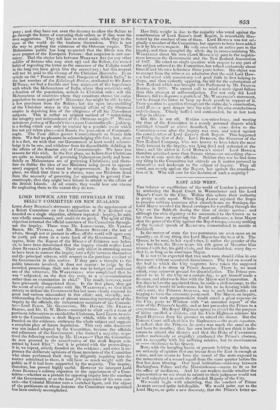LORD IIOWICK AND TIIE OFFICIALS IN THE SELECT COMMITTEE ON
NEW ZEALAND.
LORD JOHN RUSSELL'S strenuous opposition to the appointment of a Select Committee on the Colonization of New Zealand wins founded on a sine objection, ofttimes repeated : inquiry, he said, was wholly unnecessary, and could do no good. The spirit of this objection actuated the official members of the Committee through- out the inquiry. These were Mr. LABOUCHERE; Mr. VERNON SMITH, Mr. TUFNELL, and Mr. ROBERT STEUART ; the last of whom, though not at present in office, all the world will agree may be justly put down as a mere hack of the Government. They appear, from the Report of the Minutes of Evidence now before us, to have been determined that the inquiry should realize Lord JOIIN RUSSELL'S prediction. Their only object hoattending seems to have been to convert the inquiry into a fight between themselves and the principal witness, with respect to the previous conduct of the Government in this matter. If they gave a thought to the public interests involved, it does not appear: to judge by the recorded proceedings, their sole aim was to badger and contbund one of the witnesses, Mr. WAKEFIELD ; who complained that be was " subjected, on the first day even, to a cross-examination rather than an examination in chief." The result, however, must have grievously disappointed them. In the first place, they got the worst of every encounter with Mr. WAKEFIELD ; so that their anxiety to defend the Government has but more clearly exposed its great and various misconduct in this aflhir : and, secondly, not- withstanding the hindrance of almost unceasing interruption of the inquiry by the officials, the independent members of the Commit- tee—Lord ELIOT, Mr. GLADSTONE, Mr. Hawas, Mr. FRANCIS BARING, and Mr. G. W. Hors—managed to elicit such a amass of pertinent information as enabled the Chairman, Lord ELIOT, to sub- mit to the Committee a draft Report which, while it is strictly founded on the evidence, embraces the whole subject and suggests a complete plan of future legislation. This very able document was not indeed adopted by the Committee, because the officials and adherents of the Government, who formed a majority, nega- tived the following motion by Mr. Ilawes—" That the Committee do. now proceed to the consideration of the draft Report sub- Fitted by Lord Eliot " : but it is printed with the proceedings ; It is, we repeat, strictly founded on the evidence ; and since it ex- presses the deliberate opinions of those members of the Committee who alone performed their duty by diligently inquiring into the matter submitted to them, it will have as much weight with the public as if it had been supported by the majority. The inquiry, therefore, has proved highly useful. However we interpret Lord JOHN Resserm's solitary objection to the appointment of a Com- 'Twee—whether as a pretext for opposing inquiry into the conduct of' the Government, or as the bona fide expression of his own con- ceit—the Colonial Minister cuts a wretched figure, and the object of the petitioners at whose instance the Committee was appointed has been entirely accomplished. How little weight is due to the majority who voted against the consideration of Lord Examyr's draft Report, is remarkably illus- trated by the conduct of one of them. Lord Howlett was not ori- ginally a member of the Committee, but appears to have been added to it by his own request. He only once took an active part in the inquiry, and then occupied the whole day in cross-examining Mr. WAKEFIELD about his own (Lord Homers's) part in the negotia- tions between the Government and the New Zealand Association of 1837. He asked no single question with respect to any part of the subject referred to the Committee, but talked exclusively about himselland his own behaviour three years before. His object was to extract from the witness an admission that the said Lord How- 1Cli had acted with consistency and good faith in first helping to shape, and then violently opposing, the bill for the colonization of New Zealand which was brought into Parliament by Mr. FRANCIS BARING in 183S. We cannot call to mind a more signal failure than this attempt at self-exculpation. For not only did Lord HOWICK fail to disprove a particle of Mr. Waaramezom's statement, but he forced the latter to heap up fresh proofs in support of it. From TICSIi011 to question throughout the entire day's examination, Lord Howesis gets deeper into the mire of his own crotchetiness and obstinacy. Utterly baffled and confounded, he at last took refuge in silence.
But this is not all. Besides non-attendance, and wasting the time of the Committee in a merely personal dispute which exhibited himself' as above described, he came down to the Committee-room after the inquiry was over, and voted against the consideration of Lord ELIOT'S draft Report. This happened on Friday the 31st of July. Lord Dualism, time Governor of the New Zealand Company, who was known to have taken the most lively interest in the inquiry, was lying dead and unburied at the time ; and his widow is Lord It»vica's sister! Lord HOWICK therefore practised more than Roman virtue—or something else— in order to vote with the officials. Neither they nor he had done any thing in the Committee but obtrude on it matter personal to themselves and irrelevant to the subject of inquiry. They all voted, not merely against the Report, but against the considera- tion of it. Who will care for the decision of such a majority ?


























 Previous page
Previous page